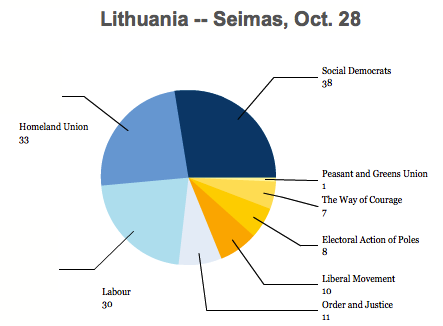So we have the results of Lithuania’s full two rounds of elections: the Lietuvos socialdemokratų partija (LSDP, Social Democratic Party of Lithuania) have won the greatest number of seats in the Seimas, Lithuania’s parliament, following a runoff election yesterday.![]()
Although 70 seats are determined by proportional representation on the basis of the first-round vote on October 14, the LSDP won a disproportionately high number of the 71 seats in the Seimas that are determined in single-member districts.
In the first round of the election, the more populist Darbo Partija (DP, Labour Party), led by Russian-born Viktor Uspaskich, won 19.96% of the vote, while the Social Democrats won just 18.45% and the governing Tėvynės sąjunga – Lietuvos krikščionys demokratai (TS-LKD, Homeland Union — Lithuanian Christian Democrats) of outgoing prime minister Andrius Kubilius won 14.93%.
For lots of reasons, this scared the rest of Europe. Uspaskich, under investigation a few years ago for corruption, actually hid out in Russia, so a Uspaskich-headed government would be a nightmare for Europe, given that Lithuania’s already not just a European Union member, but a member of the North Atlantic Treaty Organization.
But by the end of the second round, the Social Democrats took 23 of the 71 single-district seats — Homeland Union won just 20, and Labour won just 12 — much like in past Lithuanian elections, Labour had a stronger result from the proportional results than from the direct-election results.
The result, which will give the Social Democrats the largest bloc of seats in the Seimas, makes it all but certain that the leader of the Social Democrats, Algirdas Butkevičius (pictured above, bottom), a former finance minister, will become Lithuania’s next prime minister. Furthermore, although he’s signed an electoral pact with Uspaskich’s Labour Party and Tvarka ir teisingumas (TT, Order and Justice), a shape-shifting populist party led by former president Rolandas Paksas, who was impeached for corruption in 2004, the result will give Butkevičius a boost vis-a-vis even his coalition partners.
So Europe, which was wary of a Uspaskich-dominated government (even if Labour ultimately won more seats than the Social Democrats, will be a little more relaxed following Sunday’s runoff vote — although it was always thought that Butkevičius would nonetheless become prime minister, his position will be much stronger than Uspaskich’s, or any of the more nefarious characters of Lithuanian politics, with the Social Democrats having won the clearest plurality of parliamentary seats.
Kubilius, who had a difficult hand to play after the past four years in government, duly trimmed the Lithuanian budget after the financial crisis of 2008-09 saw Lithuania’s GDP plummet by 15%. Indeed, the Lithuanian election result, in both rounds, was much better for Kubilius’s Homeland Union than polls had suggested, indicating that Kubilius received more credit than expected from a Lithuanian electorate that’s nonetheless weary of austerity, economic stagnation and unemployment.
Although Butkevičius won’t likely be able to effect a 180-degree change in Lithuanian policy, he has championed the introduction of a progressive income tax and minimum salaries. Furthermore, although he’s been less enthusiastic (along with much of eastern Europe) about his country’s accession into the eurozone, European leaders seem much likelier to be happy with a pro-European center-left prime minister like Butkevičius than either Uspaskich or Paksas.
So ultimately, on a day when Ukraine seemed to fall further backwards on democracy and the rule of law, Lithuania seems to have marked another peaceful transfer of government within the broad tradition of European political norms.

